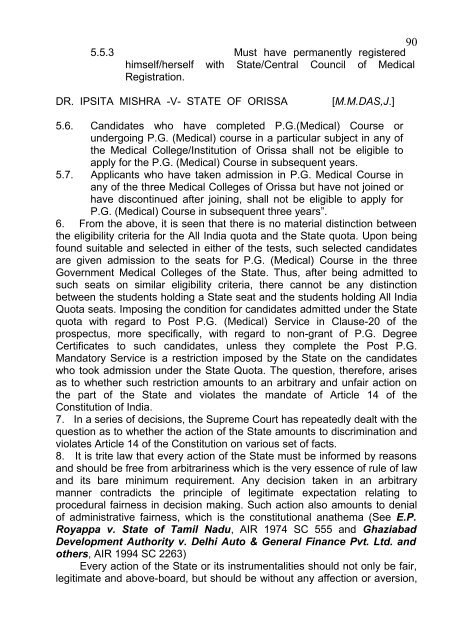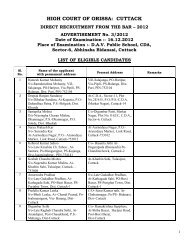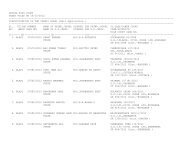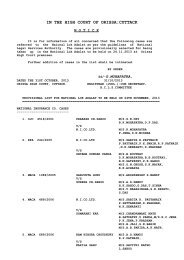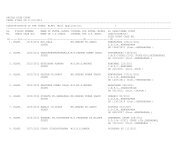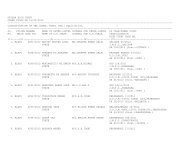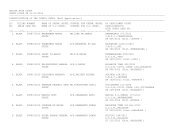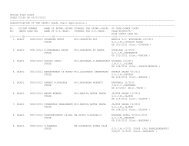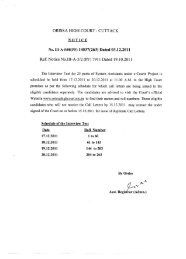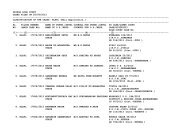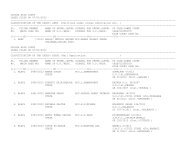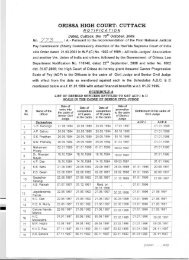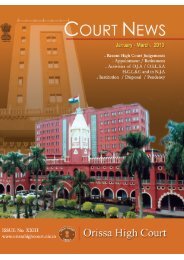ORIGINAL JURISDICTION - Orissa High Court
ORIGINAL JURISDICTION - Orissa High Court
ORIGINAL JURISDICTION - Orissa High Court
You also want an ePaper? Increase the reach of your titles
YUMPU automatically turns print PDFs into web optimized ePapers that Google loves.
90<br />
5.5.3 Must have permanently registered<br />
himself/herself with State/Central Council of Medical<br />
Registration.<br />
DR. IPSITA MISHRA -V- STATE OF ORISSA [M.M.DAS,J.]<br />
5.6. Candidates who have completed P.G.(Medical) Course or<br />
undergoing P.G. (Medical) course in a particular subject in any of<br />
the Medical College/Institution of <strong>Orissa</strong> shall not be eligible to<br />
apply for the P.G. (Medical) Course in subsequent years.<br />
5.7. Applicants who have taken admission in P.G. Medical Course in<br />
any of the three Medical Colleges of <strong>Orissa</strong> but have not joined or<br />
have discontinued after joining, shall not be eligible to apply for<br />
P.G. (Medical) Course in subsequent three years”.<br />
6. From the above, it is seen that there is no material distinction between<br />
the eligibility criteria for the All India quota and the State quota. Upon being<br />
found suitable and selected in either of the tests, such selected candidates<br />
are given admission to the seats for P.G. (Medical) Course in the three<br />
Government Medical Colleges of the State. Thus, after being admitted to<br />
such seats on similar eligibility criteria, there cannot be any distinction<br />
between the students holding a State seat and the students holding All India<br />
Quota seats. Imposing the condition for candidates admitted under the State<br />
quota with regard to Post P.G. (Medical) Service in Clause-20 of the<br />
prospectus, more specifically, with regard to non-grant of P.G. Degree<br />
Certificates to such candidates, unless they complete the Post P.G.<br />
Mandatory Service is a restriction imposed by the State on the candidates<br />
who took admission under the State Quota. The question, therefore, arises<br />
as to whether such restriction amounts to an arbitrary and unfair action on<br />
the part of the State and violates the mandate of Article 14 of the<br />
Constitution of India.<br />
7. In a series of decisions, the Supreme <strong>Court</strong> has repeatedly dealt with the<br />
question as to whether the action of the State amounts to discrimination and<br />
violates Article 14 of the Constitution on various set of facts.<br />
8. It is trite law that every action of the State must be informed by reasons<br />
and should be free from arbitrariness which is the very essence of rule of law<br />
and its bare minimum requirement. Any decision taken in an arbitrary<br />
manner contradicts the principle of legitimate expectation relating to<br />
procedural fairness in decision making. Such action also amounts to denial<br />
of administrative fairness, which is the constitutional anathema (See E.P.<br />
Royappa v. State of Tamil Nadu, AIR 1974 SC 555 and Ghaziabad<br />
Development Authority v. Delhi Auto & General Finance Pvt. Ltd. and<br />
others, AIR 1994 SC 2263)<br />
Every action of the State or its instrumentalities should not only be fair,<br />
legitimate and above-board, but should be without any affection or aversion,


